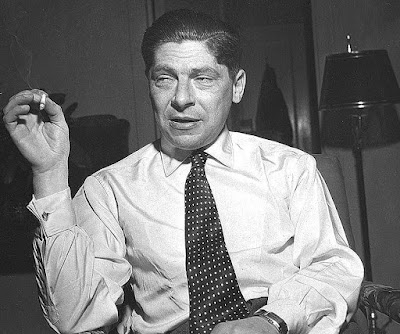Amongst many of the dilemmas that face a would be biographer of Arthur Koestler is the realisation that externally the first half of his life is much the most colourful, action packed and celebrated. Here the journalist of genius, and novelist, was forged amongst the calamitous events of the mid-twentieth century and here was a man who had a knack of being exactly in the right place and the right time.
It was a rollercoaster ride of reinvention from Zionist to Communist to anti-Communist scourge. In the course of which he had been imprisoned three times by three different states, faced death at the hand of Franco and from his own hand as he flees the advancing Germans. Here he watched his own reputation soar with the publication of his masterpiece, the novel, 'Darkness at Noon', laying bare the psychology and culture of totalitarianism. Here he awaits eagerly, given his expansive egotism, for his well deserved Nobel Prize (that incidentally never came)!
But then, he turns to science and ultimately what is worse unorthodox science. This is both extrinsically less compelling, not much dicing with death here, and if your view of the world is comfortably mainstream, disconcerting! This is where Michael Scammel's fascinating biography, "Koestler: The Indispensable Intellectual', sadly, falters. He cannot disguise his genuine puzzlement - and his attempts to slot Koestler back into the acceptable narrative of the culture is a touch feeble, haunted by the wishful thinking of the indispensability of its titling.
This is a pity because in doing so, he fails to sufficiently address why Koestler took this turn and what it might mean for either him or for the culture at large. After all here was a man with an unerring ear for what was important, what was coming next, why our current fashions might be an emperor parading in the nude? Did he just lose this ability or was he still on the trail of the future?
Here are three reasons why he might still be sounding out the future rather than trapped in an echo chamber of his own making?
First because, like many of his prescient contemporaries, he did not believe the then current assumption that the secular was progressively on the march. Religion was not in the process of simply withering away; and, even if you thought its current dogmatic structures were unsustainable, what religion points to, engages with and involves, remains a critical, if not the critical, aspect of what it might mean to be human.
Second, if this is so, it would be important to trace historically when the practice of science and religion parted company as explorations of cosmic wonder and patterns of meaning making and wonder whether that splitting into technocratic materialism, of science increasingly fracturing into narrow specialisms; and, religion travelling inward justifying itself by faith alone, began and whether that beginning was inevitable. Were there tracks back to more holistic, systemic ways of thinking that remarry contemplative intuition and reasoning, purpose and science?
Third, if we are to look for signs of a re-emergent connectivity between the scientific and the religious enterprise after knowing, we cannot expect it necessarily to emerge from the mainstream. Everything he had learnt about politics was how easy it was for a mainstream to become a rigid orthodoxy, imposing patterns of thinking by subtle, and not so subtle, pathways of authority gone authoritarian. Yes, the byways and outliers undoubtedly contained the wacky and the crazed but also perhaps the weird and the wonderful. If Koestler became a crank, a 'crank' as his acquaintance, E.F. Schumacher, noted is a 'small, useful tool and it creates revolutions'!
This, at the very least, makes Koestler's explorations into creativity, cosmology, and evolution interesting and, for his reminder, that science is as messy a business as any human endeavour, salutary, even if it does not make him indispensable (who is one wonders)! Scammel's failure to read Koestler's interest against a broader understanding of the 'counter-culture' that Koestler was recognising is the book's one principal flaw.
But too, even if the biography was only published in 2009, events, the stubborn refusal of history to end, and the swing back towards authoritarianism in politics (and the playing fast and loose with the truth, that, in truth, is nothing new) should make Koestler's life and thought current again - even if the deeper questions he poses about what we take to be the nature of things does not. If people are pouring over Orwell's '1984' for clues of navigating Trump land, they might like to add, his friend's, Koestler's 'Darkness at Noon' not least because, unlike Orwell, Koestler had been 'inside the belly of the beast' and is the better, more forensic, psychologist.

Comments
Post a Comment